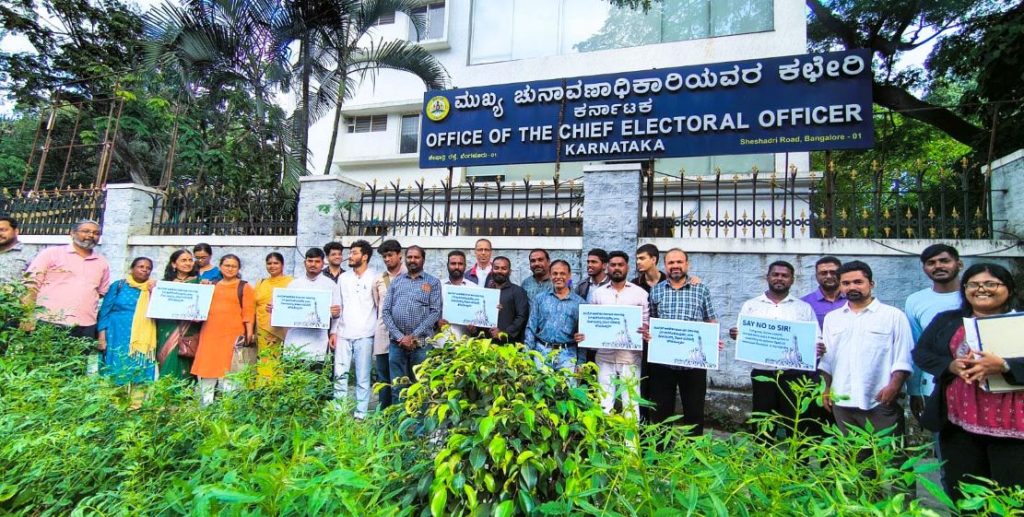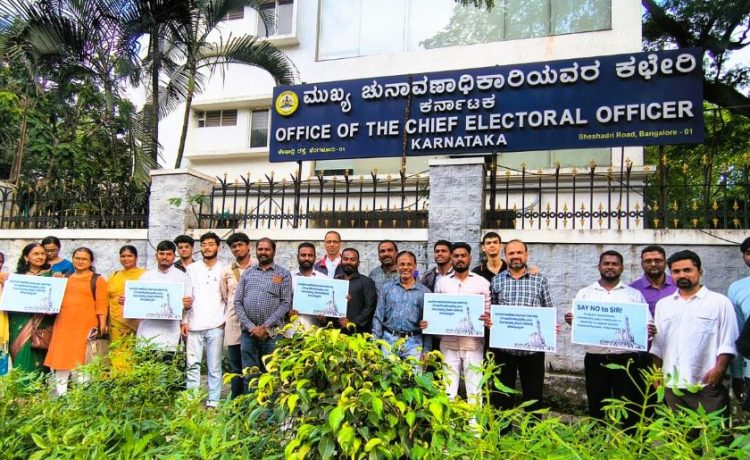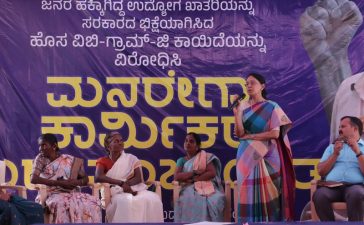Civil Society Coalition Calls on Election Commission to Halt ‘NRC-like’ Special Intensive Revision in Karnataka
Activists warn the move could disenfranchise lakhs of marginalised voters; demand transparency and consultation before proceeding.
Bengaluru, 17 October, 2025: A broad coalition of civil society organisations under the banner My Vote, My Right has called upon the Election Commission of India (ECI) to immediately suspend the Special Intensive Revision (SIR) of electoral rolls in Karnataka. In a meeting on Friday with Joint Chief Electoral Officer (JCEO) Yogesh, the group submitted a memorandum warning that the exercise could lead to mass exclusion of voters, particularly the poor, Dalits, minorities, and migrant workers.
JCEO Yogesh, while confirming that training sessions for the process had begun, clarified that no statewide implementation had yet commenced. “We have started the preparatory process as per the directions received from the ECI. However, we are yet to receive specific instructions to implement SIR in Karnataka,” he said. When questioned about widespread voter deletions in Bihar’s SIR process, he declined to comment, noting, “Bihar is not in my jurisdiction.”
The official assured the delegation that their concerns would be examined and forwarded to the Chief Electoral Officer for appropriate action.
Concerns of Disenfranchisement and Unfair Burden
The coalition’s memorandum, endorsed by over 23 organizations including trade unions and citizens’ groups, voiced alarm that the SIR framework effectively reverses the burden of proof in voter registration. It requires every registered voter to produce documents verifying citizenship — a move they argue disproportionately harms communities with limited document access.
The memorandum stated that widely used IDs such as Aadhaar, MGNREGA job cards, and voter cards would not be accepted as proof of citizenship, potentially erasing lakhs of names from the rolls. “This will leave people from SC, ST, Muslim, and economically weaker sections at risk of losing their right to vote,” the statement read.
Advocate Vinay Srinivasa, a member of the coalition, criticised the process sharply: “What is being introduced in the name of SIR is not a revision of rolls but a re-verification of citizenship. It shifts the burden of proof onto the citizen, which is unconstitutional and deeply unjust.”
Activists further argued that the requirement for those born after 1987 to prove both their and their parents’ citizenship is a violation of the universal adult franchise guaranteed under Article 326 of the Constitution. They also cautioned that the digital verification procedure would further marginalize students, migrant workers, and those without consistent internet access.

Comparisons to NRC and the Bihar Experience
The coalition warned that the SIR could become a “citizenship test by stealth,” drawing parallels with the controversial National Register of Citizens (NRC). Members expressed concern that electoral officers have been granted powers to flag “suspected foreign nationals,” a step that could lead to harassment of minorities and the poor.
Citing Bihar’s recent experience, where nearly 65 lakh names were reportedly deleted following the SIR, the group said, “Instead of ensuring every eligible voter remains on the rolls, the SIR framework seems designed to let the state decide who gets a vote.”
Advocate Manavi Atri observed, “The SIR is essentially NRC in disguise. It gives arbitrary powers to officials to question citizenship, turning voter verification into an exclusionary exercise. We’ve already seen the havoc it wreaked in Bihar — Karnataka must not repeat that mistake.”
Many activists argue that attempts to push such exercises betray a centralizing tendency of the Modi-led NDA government, which has repeatedly ignored legitimate concerns and warnings from civil society. By imposing verification schemes without transparency, the Centre, they say, risks undermining the very foundation of India’s democracy.
The coalition’s appeal outlines several specific demands, including:
-
An immediate halt to the special revision.
-
A return to the standard, longer timeline for the summary revision to allow for comprehensive public participation.
-
A widespread and accessible voter awareness campaign in multiple regional languages.
-
Clear and verifiable procedures for the disposal of claims and objections.
Call for Immediate Suspension and Consultation
My Vote, My Right urged the Chief Electoral Officer of Karnataka to immediately halt all SIR-related preparations until the Supreme Court adjudicates the ongoing legal challenges regarding the revision process. The coalition also called for public consultations with civil society and political stakeholders to ensure that no citizen is unfairly excluded.
“The right to vote is the cornerstone of democracy,” said the memorandum. “To disenfranchise the poor and marginalized in the name of verification would be to weaken the Constitution’s promise of equality.”
Advocate Srinivasa noted that the JCEO had promised to forward their concerns to the Chief Electoral Officer. “We expect a formal response soon,” he added.
Educationist Sripad Bhat reaffirmed the group’s commitment to continue campaigning for electoral transparency. “We will persist in our efforts to ensure that India’s democratic processes remain inclusive, fair, and free from discrimination,” he said.
Key Quotes
-
“What’s being done in the name of SIR is not voter verification—it’s voter exclusion masquerading as reform.”
-
“When citizenship becomes a document and not a right, democracy stands on shaky ground.”
-
“The poor and the marginalised should not pay the price for the government’s obsession with control.”
-
“My Vote, My Right is fighting not just for names on a roll, but for the soul of Indian democracy.”
-
“An electoral process that doubts its citizens cannot claim to be free or fair.”
Possible Impact of SIR
-
On the core threat: “This rushed revision isn’t about cleaning the voter list; it’s about cleaning out legitimate voters. We are staring at the mass disenfranchisement of thousands.”
-
On the process: “Democracy cannot be rushed. An ‘intensive’ drive that sacrifices transparency and public participation is a threat to the very foundation of our electoral integrity.”
-
On the impact on marginalized groups: “This compressed timeline disproportionately targets the most vulnerable—migrants, daily wage workers, and the poor—who lack the means to navigate this sudden, complex process.”
-
A direct appeal to the EC: “To the Election Commission, we say: Your mandate is to protect the voter, not to disenfranchise them. Halt this drive and return to a timeline that respects democracy.”
-
A warning: “If this revision proceeds as planned, the sanctity of every future election in Karnataka will be under a cloud of doubt. The Commission must choose: efficiency or integrity?”
![]()











